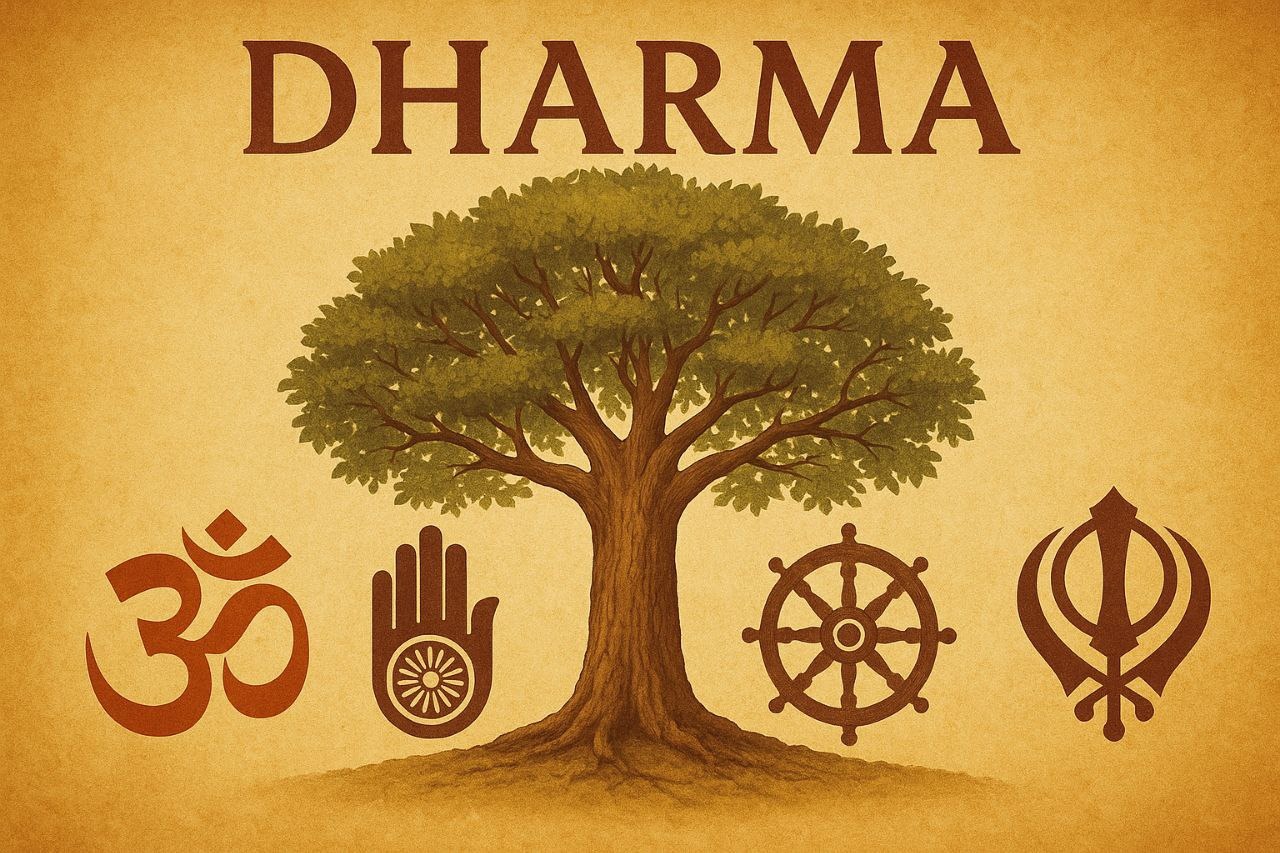Dharma: The Eternal Law of Bharat Beyond Religion

When we reflect on the spiritual and philosophical roots of Bharatvarsh (India), one truth shines above all: the traditions that emerged here are not merely “religions” but Dharmas. This difference is not just a matter of language; it is a matter of essence. The West uses the word religion to denote faith systems built upon belief, dogma, and institutional authority. In contrast, Bharat has always spoken in terms of Dharma, an eternal principle that upholds life, cosmos, and righteousness.
Religion is often bound by community and creed, whereas Dharma is boundless, it is about living in harmony with truth, nature, and the eternal cosmic order.
The Meaning of Dharma
The Sanskrit root dhṛ means “to hold, to sustain.” Dharma is therefore that which upholds existence. It is the natural law, the cosmic rhythm, the principle of truth, justice, compassion, and righteousness. Dharma is not man-made. It is not a decree of a single prophet or authority. It is the eternal principle of life itself, discovered and lived by countless Rishis, Yogis, and seekers through inner experience (anubhava).
To be Dhārmic is not necessarily to be religious. A Dhārmic person may or may not follow rituals, but they live by truth, compassion, and righteousness. A religious person, on the other hand, may perform countless rituals yet still remain far from Dharma if their actions lack truth and compassion.
"Religion is belief in something outside you; Dharma is awakening to the truth within you." ~ Adarsh Singh
Sanātan Dharma: The Eternal Foundation
The original Dharma of this sacred land is Sanātan Dharma, the Eternal Law. Sanātan means “that which has no beginning and no end.” Sanātan Dharma is not an organized religion; it is a timeless path, a vast ocean of wisdom, embracing every seeker and every path toward the ultimate truth.
Sanātan Dharma recognizes multiple approaches to spiritual realization, the path of knowledge (Jnana), the path of devotion (Bhakti), the path of meditation (Dhyāna), and the path of selfless action (Karma). Its beauty lies in inclusivity and in recognizing that all beings are part of the same cosmic family (Vasudhaiva Kutumbakam).
It is from this infinite tree of Sanātan Dharma that many distinct branches emerged, Hindu Dharma, Jaina Dharma, Bauddha Dharma, and Sikh Dharma.
The Dharmic Traditions of Bharat
Hindu Dharma
Hindu Dharma is the living, evolving expression of Sanātan Dharma itself. It embraces the Vedas, Upanishads, Puranas, the philosophies of Yoga, Vedanta, Tantra, and Bhakti traditions. It recognizes countless deities yet ultimately points to the One reality, Brahman(ब्रह्म), the Absolute Truth. Its paths are many, but its goal is one: Self-realization and liberation (Moksha).
Jaina Dharma (Jainism)
Jainism took the principle of Ahimsa (non-violence) to its highest expression. It emphasizes truth, non-possessiveness, and rigorous self-discipline. Liberation (Kevala Jnana) is attained through purity of conduct, meditation, and self-restraint.
Bauddha Dharma (Buddhism)
Founded by Siddhartha Gautama, the Buddha, this Dharma focused on freedom from suffering through the Middle Path. The Four Noble Truths and the Eightfold Path became guiding principles for millions. Buddhism emphasizes compassion, mindfulness, and inner awakening.
Sikh Dharma (Sikhism)
Rooted in the teachings of Guru Nanak and the Sikh Gurus, Sikh Dharma emphasizes the Oneness of God (Ik Onkar), equality of all beings, selfless service (Seva), courage, and spiritual discipline while living as a householder.
The Common Thread of Dharma
Though these traditions may appear distinct, a closer look reveals that they are all rooted in Sanātan Dharma’s eternal principles.
Ahimsa (Non-violence and Compassion) ~ emphasized in Jainism and Buddhism.
Satya (Truth) ~ central in Hindu Dharma and Jaina Dharma.
Dhyāna (Meditation and Awareness) ~ practiced in Hindu Yoga, Buddhism, and Jainism.
Seva (Selfless Service and Duty) ~ highlighted in Sikh Dharma and Bhakti traditions.Moksha/Nirvana (Liberation) ~ the ultimate goal across all Dharmas.
Each path shines light on a different aspect of truth, but together they form the rainbow of Sanātan wisdom.
"Religion may divide people by names and practices, but Dharma unites all through eternal principles of truth, love, and harmony." ~ Adarsh Singh
Why the West Calls It Religion, But Bharat Calls It Dharma
The Western concept of religion is historical and institutional: it begins with a prophet, a book, or a divine revelation and then becomes a structured system of beliefs and rituals. It often emphasizes exclusivity: one God, one book, one path.
Bharat’s vision of Dharma is universal and inclusive: many Rishis, many books, many paths, yet one ultimate truth. Dharma does not bind, it liberates. It does not impose, it inspires. It does not divide humanity into believers and non-believers; it embraces all as children of the same eternal truth.
The Eternal Relevance of Dharma
In today’s age of conflict, confusion, and division, the message of Dharma is more relevant than ever. Dharma teaches us that truth is universal, compassion is the highest virtue, and liberation is the birthright of every soul.
Sanātan Dharma is not a religion of yesterday, it is the eternal path of today and tomorrow.
"Dharma is not about worshipping the eternal; it is about living the eternal." ~ Adarsh Singh
The Dharmas of Bharat are not religions in the narrow sense; they are expressions of the Sanātan truth that transcend time and space. Hindu Dharma, Jaina Dharma, Bauddha Dharma, and Sikh Dharma are branches of the eternal tree of Sanātan Dharma, each highlighting different facets of universal wisdom.
To call them “religions” is to diminish their scope. They are Dharmas, eternal, profound, and rooted in cosmic law.
"Religion speaks of God; Dharma makes you live as divine." ~ Adarsh Singh
Tue Aug 19, 2025
